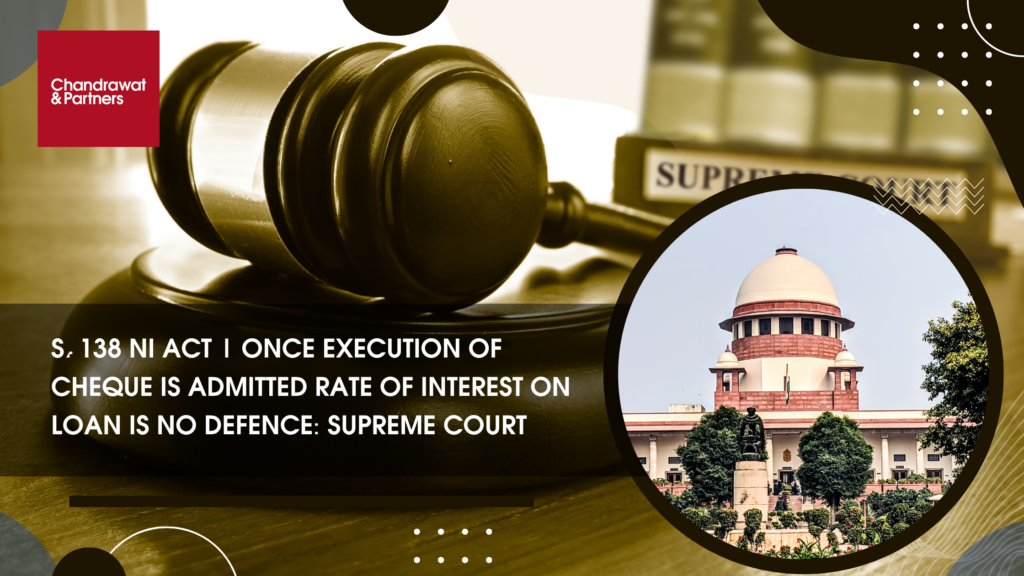Home > Recent Judgements > S. 138 NI Act | Once execution of cheque is admitted rate of interest on loan is no Defence: Supreme Court
August 20, 2024

Introduction
The Indian legal system continuously evolves and addresses complex interactions between borrowers and lenders. A recent Supreme Court ruling in the case of Sri Sujies Benefit Funds Limited vs. M. Jaganathuan has clarified a significant aspect of Section 138 Negotiable Instruments Act, 1881 (the “NI Act”). This ruling underscores the importance of cheque execution and its implications on disputes related to loan agreements.
The Supreme Court in Sri Sujies Benefit Funds Limited vs. M. Jaganathuan held that once the person admits execution of cheque then the defence regarding the rate of interest on principal amount cannot be raised. The bench observed that once the cheque reflects the exact amount of principal amount along with the rate of interest and the same is executed by the accused then the contention regarding rate of interest cannot be raised.
Background
In this case, the respondent had sent a cheque of Rs. 19 lakhs to a chit fund business for the amount to settle unpaid debts. The check was returned with the endorsement “Account Closed” when it was presented. The trial court found the respondent guilty under Section 138 NI Act. But the appellate court acquitted him and the same decision was upheld by High Court as well.
The appellate court concluded that the amount was incorrectly calculated by using a monthly interest rate of 3% rather than 1.8%. As the relief was not sought in both appellate court and High Court, petitioner filed an appeal before Supreme Court.
Arguments raised by the parties
- The chit fund company contended that the interest was supposed to be 3% annually in accordance with the Statement of Accounts.
- The respondent argued that cheque was not for repayment of loan and
- The interest of loan at 3% amounting to 36% per annum would breach the limit provided in Tamil Nadu Prohibition of Charging Exorbitant Interest Act, 2003.
Ruling of the case
The bench observed that once the cheque reflects the exact amount of loan along with the rate of interest and the same is executed by the accused then the contention regarding rate of interest cannot be raised. The Supreme Court also held that since the accused has accepted the execution of cheque the rate of interest cannot be the relevant issue.
In reference to the case of Dashrath Rupsingh Rathod vs. State of Maharashtra, it was held that offence under 138 NI Act is committed as soon as the cheque is dishonoured. The Supreme Court also hinted at mala fide intentions of accused as the cheque was dishonoured due to closing of account raising suspicions on accused.
Supreme Court rejected the respondent`s argument on exceeding limit of rate of interest as mentioned in Tamil Nadu Prohibition of Charging Exorbitant Interest Act, 2003 stating that the accused himself agreed to the amount and he cannot take a plea in the proceedings under the NI Act to contend the higher rate of interests.
Judgement
The Hon’ble Supreme Court in its decision convicted the accused under section 138 NI Act and reversed the decision of acquittal granted by appellate court as well as High Court, upholding decision of trial court. The court further ordered to pay the amount one and half times to the amount mentioned in cheque. As the accused was over the age of 86 years, the court waived the punishment of imprisonment but in case of default in payment, imprisonment of one year would be revived.
Highlights of the Case
Execution Of Cheque
Execution of cheque plays pivotal role in determining liability under section 138 of NI Act. Once a borrower acknowledges that they have issued a cheque, this acknowledgment becomes key factor in any legal proceedings related to the cheque’s dishonour.
Irrelevance of Loan Terms and Rate of Interests
The court clarified that disputes concerning the terms of the loan such as rate of interest do not affect the liability under Section 138 of NI Act. This means that even if there is a disagreement about the loan’s conditions, it does not excuse the drawer from fulfilling their obligation once the cheque is issued.
Precedent
The Supreme Court in its decision clarified that once there is admissibility of execution of cheque no defence can be sought against rate of interest and other loan terms.
For more information or queries, please email us at
enquiries@chandrawatpartners.com




